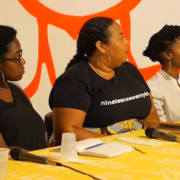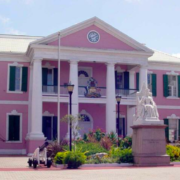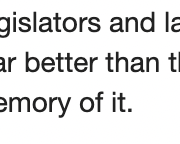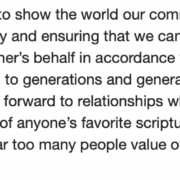It’s open season, but don’t worry. They’ll only kill the people they recognize, and only if they’re afraid. The Royal Bahamas Police Force is on a mission, and no one cares to intervene.
Many in The Bahamas have looked on and formed strong opinions of the Black Lives Matter movement and the actions it has taken in response to state-sanctioned killings by police officers. We often feel far-removed from events in the U.S., especially where issues of race are concerned. Black Lives Matter is necessary because black people were — and continue to be — specifically targeted by police.
Ava DuVernay’s documentary 13th gave context to the issues of race, policing, and prisons experienced today, linking them to the historical oppression of black people from slavery to the prison industrial complex. Again, we have mentally distanced ourselves from what we read as a U.S.-issue. For most of us, the majority of the people we encounter on a daily basis are black. Our police officers are black. Surely that means we cannot experience racism. That has to mean black people will be treated fairly, and we are free of the oppression African-Americans suffer. Right?
If you hold those opinions, you are definitely wrong. There are two things we need to be aware of — internalized racism and institutional racism.
Internalized racism is learned. As we experience racism, we begin to develop ideas and behaviors that uphold racism. It is systemic, structural, and cross-cultural, so it can pit members of oppressed communities against each other. Think, for example, of how women can internalize misogyny, and begin to support the idea that we would all be better off if we dress and behave in particular ways, finding it easy to look down on a woman of different socioeconomic status, age, or marital status. Internalized racism functions in a similar way. He wouldn’t be pulled over if he would just cut his hair. Stop driving that Honda. Move with less people in his crew. Stay out of that area. We find excuses for people to be violated by those who hold power.
Institutional racism is enforced. It is a pattern of treating a group of people poorly because of their race. Examples include students being sent home from school because their natural hair does not meet the Eurocentric beauty standards. As in this example, the action seems to fit a rule or standard of the institution; not because it is valid, but because the institution was built for the benefit and service of white people. We don’t have to know it is happening to participate in it. Just two years ago, I heard police officers brag about chasing young black men out of the downtown area, sending them “back Ova Da Hill.” Hearing this, I asked them who The Bahamas is for, and why they think they can restrict people’s movement based on race, age, and gender. They could not respond, and were forced to acknowledge, among other issues, institutional bias coupled with internalized racism.
The rhetoric around police killing civilians is ludicrous. People would more readily excuse homicide than interrogate the practices of police officers on the street. The assumption is always that the person must have done something wrong for the police to be engaged, and if they have done something wrong — whatever it is — they deserve death. The entire justice system goes out of the window because we find it more expedient for the police to operate like vigilantes. We do not believe people are innocent until proven guilty. Location, appearance, association, and proximity to a weapon are all valid reasons to meet your demise. Did we believe that Trayvon Martin should have been shot for walking through a neighborhood with a bag of Skittles?
The Royal Bahamas Police Force’s press team has learned to use “in fear for their lives” to convince us that there was a good reason to shoot and kill a citizen. There is a popular opinion that fear is a reasonable excuse for firing a weapon to kill another person. In a social media post, Erin Greene said, “the constant response of ‘in fear’ suggests an emotional response, and not a determination made with critical reasoning skills.” This should terrify rather than assuage us. Are police officers not taught to think critically and consider all options? Even if the decision is to shoot, why shoot to kill rather than incapacitate?
Sure, police officers need to make quick decisions. It is also a reasonable expectation that they are sufficiently trained and able to police themselves. Police officers are not the judge or the jury. They should not be the executioner, especially given the ruling of the Privy Council on the death penalty. Wait.
Perhaps this is the RBPF’s way of carrying out the death penalty. It is entirely possibly that they, as has been rumored, are fed up with the justice system. They are tired of making arrests, putting their lives in danger, and waiting for verdicts. Maybe they are tired of seeing the people they arrested out on bail for extended periods of time, or being found innocent. Is this an informal strategy?
Do not be tricked into believing in a false dichotomy. A commenter on social media said, “We are at a junction in our development where we have to decide on whose side we are on; the police or the heartless criminal.” We must first understand that every person police officers encounter is not a criminal. Even if they are suspects, they have the right to a fair trial. Fighting on the side of criminals is not the same as demanding due process for all. It is not the same as acknowledging the value of a life. A text message to a radio talk show read (in part), “police have to get royal,” meaning they need to take extreme action to send a clear message. This is how the people around us are thinking.
There have been five killings by police in 2018, and 10 since November 2017. Minister of National Security Marvin Dames said, “the focus on counts shouldn’t be the issue.” Just last month, he reminded the PLP that there were 33 homicides in the first two months of 2017, and in September 2017, he noted that crime was down 19 per cent along with other statistics. Numbers are obviously important, and we need to pay attention to trends.
Dames, less than one year into the job, is shirking responsibility. He said of police officers, “[if] he or she feels threatened, I can’t make that decision for them. They have to make that for themselves.” So much for accountability. Zero tolerance only applies to civilians, and police officers can do as they please, so long as they feel fearful or threatened. What a license to have. Is any one else scared out there?
Dames would also have us believe it is excusable that most people killed by police this year were “known to police.” We all know people in this category, for various reasons, who do not have a criminal record. They may wear their pants low or have dreadlocks, and may have spent nights in the police station, but they are not criminals. That’s just too bad. They are known to the police, and it’s open season. What number must we reach, who must be killed, or which scripture do we need to read and understand to intervene in state violence and affirm the humanity of the black Bahamian people we know, do not know, and are “known” to the police?
Published by The Tribune on February 14, 2018.











Leave a Reply
Want to join the discussion?Feel free to contribute!